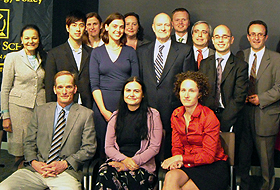
The co-host, Dr. Jonathan Linton and a member of the selection committee, Dr. Scott Findlay joined the students in Washington for this event designed to provide graduate students from all faculties an opportunity to enrich their research experience by networking with members of the S&T policy community. While the schedule was packed, the students were able to make some time to enjoy various parts of the city between some of the events.
The Bromley event began with a meeting with the Assistant Director for Federal R&D at the White House Office of Science and Technology Policy (OSTP). Kei Koizumi spoke of the challenges facing the new administration. Some of these include the need to introduce members of the OSTP with some of the government's mechanisms given that the OSTP has no "layer" of civil service workers. He also discussed the inherent difficulties in evaluating S&T policies since the metrics often used to gauge the efficacy of policies are based on models that do not accurately capture the reality of S&T activities (e.g., the linear model of innovation).
For the keynote lecture, the former Cabinet-level Director of the OSTP, John Marburger, introduced one of the projects that he championed during the Bush administration called the Science of Science Policy (SoSP).
This new paradigm advises policy makers in basing their decisions on a framework of measurable and quantifiable outcomes while shaping the nation's S&T policy environment. "Policies should be viewed as hypotheses" and further, "failing policies should have mechanisms to be easily cancelled" he urged. Marburger candidly recounted that the biggest flaw with S&T policy during the Bush administration was related to the poor management of STEM education (pun most likely unintentional). America, he says, needs to set high standards when training future generations of highly qualified and scientifically literate citizens.
During the following two days, we attended the American Association for the Advancement of Science's (AAAS) annual forum on S&T policy. At this forum, we met privately with John Holdren, the current Cabinet-level Director of the OSTP, who discussed the Obama administration's vision for promoting S&T. Holdren describes Obama as decidedly excited about current scientific discoveries and feats of engineering; further stating that Obama is a president "who deeply grasps the importance of S&T to our national goals." Additionally, we heard talks from many notable figures in the S&T policy community including the US Secretary of Energy Steven Chu and the Canadian Minister of State for S&T, Gary Goodyear.
According to Professor Vonortas of GWU, the mere signaling that S&T is of great importance constitutes the single most important contribution that a president can make in terms of S&T policy. It follows then that the US is poised to make great strides in increasing our collective store of scientific knowledge and capitalizing on innovations made possible by this new knowledge.


